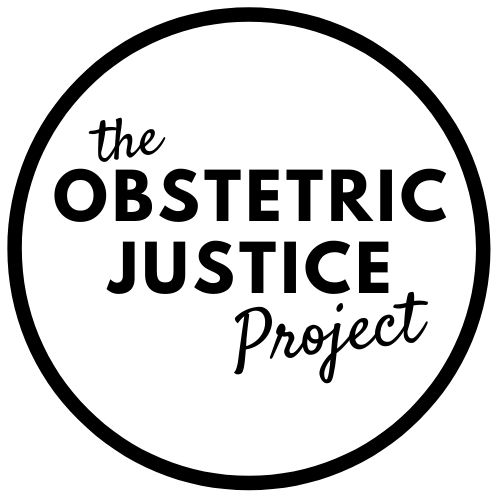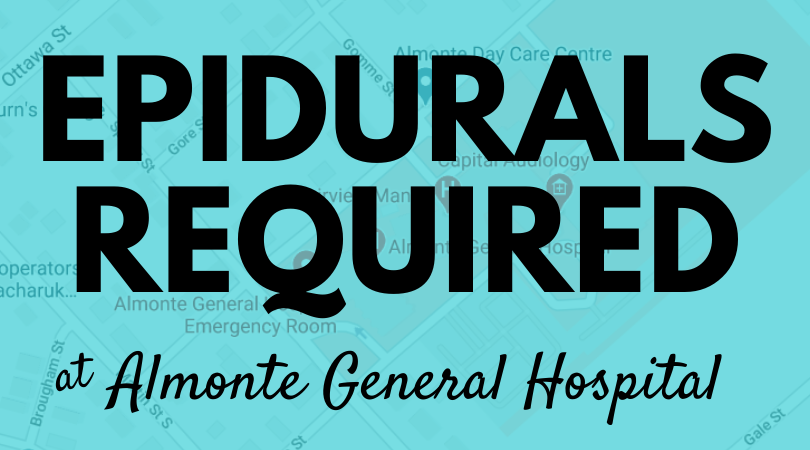CALL TO ACTION:
(Updated April 13, 2020) Almonte General Hospital in the Ottawa Valley region of Ontario has issued a new policy that attempts to remove a patient’s legal right to informed consent and refusal during childbirth.
The announcement issued April 6th states that all patients in labour are now “requested” (required) to receive an epidural, or go elsewhere to give birth. For many families in the area, it is not a choice to simply go elsewhere.
In an interview with the Ottawa Citizen, a hospital spokesperson explained, “It’s a request, not a policy”.
(The Ottawa Citizen, April 9, 2020 - “Almonte General Hospital requests all women in labour have an epidural to curb spread of COVID-19” by Joanne Laucius)
Feel free to give these folks a call or email to share your thoughts on their new request, or send a PDF for free as a fax with a website like https://faxzero.com/
Almonte General Hospital
Phone: 613-256-2500
Fax: 613-256-8549
Fax: 613-256-4120 (obstetric unit)
info@agh-fvm.com
Lynn Heath
Manager of Obstetrics and Emergency
Phone: 613-256-2500 ext 2120
lheath@agh-fvm.com
Mary Wilson Trider
President and CEO
Phone: 613-256-2514 ext 2220
mwilsontrider@agh-fvm.com
Dr. Bahaa Awwad
Chief of Obstetrics and Gynaecology
Phone: 613-256-8800
Fax: 613-256-8851
bawwad@agh-fvm.com
Dr. Heather Abramenko
Chief of Perioperative Medicine
Phone: 613-256-5656
Fax: (613) 256-5445
habramenko@agh-fvm.com
Dr. Christiane Deschenes
Chief of Staff
Phone: (613) 256-9370 Ext. 4049
Fax: (613) 256-0949
cdeschenes@agh-fvm.com
___
”April 6, 2020
Dear Colleagues,
We have found a markedly increased preparation time required for donning PPE and setting up the OP. As our operative team is not in-house there are concerns about performing an emergency C/S [c-section] in a timely manner. A general anaesthetic is to be avoided if at all possible to prevent aerosolization of the COVID-19 virus. To expedite emergency surgery should it be needed, we are requesting that all patients have an epidural (exception being rapidly labouring patient that progress to delivery before anaesthesia can arrive). If the patient is not agreeable to an epidural then we request delivery be planned in another facility so that the safety of mother and baby can be optimized.
Thank you for your cooperation during this stressful time.
Stay Healthy,
Dr. Heather Abramenko
Chief of Perioperative Medicine
AGH
Dr. Bahaa Awwad
Chief of Obstetrics and Gynaecology
AGH
Dr. Chris Deschenes
Chief of Staff
AGH”
Almonte General Hospital annoucement, April 6 2020
LEARN MORE
Epidural pain relief is an effective, useful option that many folks choose for their births. The problem comes when it isn’t a real choice. Our rights to informed consent and refusal, bodily autonomy and bodily integrity do not evaporate when we enter a hospital to give birth, even during a global pandemic. There are valid reasons for an individual to choose not to receive an epidural, and those decisions should be made freely.
Ontario Health Care Consent Act:
The consent must be informed. It must be given voluntarily, it must not be obtained through misrepresentation, fraud, coercion. Consent can be withdrawn at any time.
The patient must understand the nature of the treatment, including expected benefits, material risks and side effects of the treatment, alternative courses of action, and the likely consequences of not having the treatment.
If the only “choices” are to accept a treatment, or go elsewhere to give birth, how can patients truly give their informed consent?
This is not professional legal or medical advice
Read more: https://www.ontario.ca/laws/statute/96h02
Paraphrased from Evidence Based Birth:
Epidurals are a very effective form of pain management, but they come with a variety of risks, benefits, and side effects
Patients who receive an epidural are more likely to experience low blood pressure, which can lead to lightheadedness or nausea, and may require additional IV fluids or medications to manage
A drop in the patient’s blood pressure can compromise the oxygen status of the baby
With an epidural, there is an increased risk of needing a C-section for signs of fetal distress
There is also an increased risk of developing a fever during labour (During the COVID-19 pandemic, some Canadian hospitals are treating fevers during labour as potential COVID)
Pitocin (synthetic Oxytocin) is often needed to help augment or speed up labour with an epidural
Epidurals increase the likelihood of needing a forceps or vacuum delivery, which are more likely to cause severe perineal tears
Having an epidural can medicalize the birth (“cascade of interventions”) ie: continuous blood pressure monitoring, oxygen monitoring, IV fluids, bladder catheter, continuous fetal monitoring, restricted movement, risk of fetal distress and instrument delivery, etc


